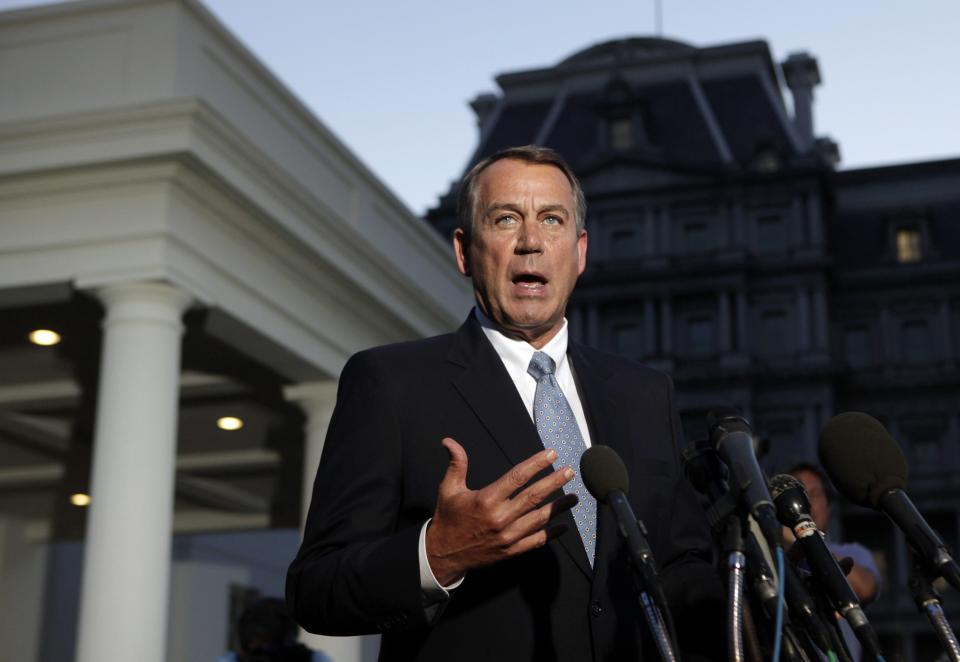Obama, lawmakers huddle but no shutdown breakthrough
No breakthrough. That was the message late Wednesday after President Barack Obama discussed the government shutdown with Republican and Democratic congressional leaders at the White House.
The 90-minute meeting came after the House and Senate failed to reach an agreement on federal spending levels this week, and House Republican leaders refused to hold a vote on a funding bill that didn’t also delay or defund part of the Affordable Care Act, also known as Obamacare.
House Speaker John Boehner, Senate Minority Leader Mitch McConnell, House Minority Leader Nancy Pelosi and Senate Majority Leader Harry Reid met with Obama. Vice President Joe Biden and Treasury Secretary Jack Lew were also present.
“The president reiterated one more time tonight that he will not negotiate,” Boehner told reporters after the meeting.
McConnell said in a statement, “The meeting was cordial but unproductive. While I appreciated the opportunity to speak directly with the President about this pressing issue, I was disappointed that he had little interest in negotiating a solution or in encouraging Senate Democrats to agree to the House request for a conference.”
Just hours before, Obama sounded a pessimistic tone about striking an agreement and warned Wall Street not to assume that Washington will somehow wring a deal out of partisan bitterness.
"This time's different," Obama told CNBC when asked whether investors should assume a deal on the budget and debt is close. "I think they should be concerned. ... When you have a situation in which a faction is willing potentially to default on U.S. government obligations, then we are in trouble. And if they're willing to do it now, they'll be willing to do it later."
The Treasury Department estimates that the federal government will reach its borrowing limit by Oct. 17, and Republicans are determined to insist on budget reforms and possibly even more delays of the federal health care law. Obama's characterization of the debate with Republicans in the CNBC interview — the president said he was "exasperated" — put a cloud over Wednesday night's shutdown confab.
“We’ve got divided government,” Boehner told reporters. “We had a nice conversation, a polite conversation, but at some point we’ve got to allow the process that our founders gave us to work out.”
Pelosi proclaimed herself “ever optimistic” but described the meeting as a “candid discussion” — a diplomatic term of art that usually means a dispute that falls short of a shouting match (which is “frank and candid”).
And she warned that the combination of a government shutdown and failure to lift the country’s debt ceiling, triggering a first-ever American government default, would be “beyond cataclysmic.”
“We just have to find a way and we have to find a path that they can go down,” she said, accusing Republicans of “moving the goalposts.”
Asked whether the country was now on a path to default, Reid replied cryptically: "I think that it looks like these people (tea party Republicans) are headed where they want to go.”
The White House summary of the meeting provided no fuel for optimism about a possible deal.
“The president remains hopeful that common sense will prevail, and that Congress will not only do its job to reopen the government, but also act to pay the bills it has racked up and spare the nation from a devastating default,” it said in a statement. “The president is glad that the Leaders were able to engage in this useful discussion this evening."
The federal government shut down on Tuesday morning for the first time in 17 years. The impasse was reached after several proposals from House Republicans to link government funding to efforts to dismantle or weaken part of Obamacare — all of which Senate Democrats rejected, saying they would accept only a “clean” bill without any added provisions.
Wednesday’s White House meeting was the first between congressional leaders and the president since the government shut down.
The House on Tuesday passed a bill requesting a conference committee to negotiate a deal, but Senate Democrats rejected it outright.
In a letter to Boehner on Wednesday, Reid reiterated his call for House Republicans to hold a vote on a "clean" bill to fund the government for six weeks. Reid promised that he would begin more broad budget negotiations when they did.
Republican leaders expressed skepticism, however, about the president's intention for the meeting.
“We’re pleased the president finally recognizes that his refusal to negotiate is indefensible,” said Boehner spokesman Brendan Buck in a statement. “It’s unclear why we’d be having this meeting if it’s not meant to be a start to serious talks between the two parties.”
And McConnell spokesman Don Stewart said, "Just yesterday, the president reaffirmed that he would not negotiate with Congress, and Senate Democrats actually voted not to negotiate. So frankly, we’re a little confused as to the purpose of this meeting.
"If the president wants to sit on the sidelines during this critical debate and is serious about Congress finding a solution, then he will urge Senate Democrats to agree to the request by the House of Representatives to convene a conference committee."
Meanwhile, the Republican-held House of Representatives staged three more votes: Lawmakers defeated a Democratic effort to bring up a “clean” version of the spending bill in a largely party-line 230-194 vote. They then voted 252-173 to reopen national parks and museums and 254-171 to fund the National Institutes of Health and in particular programs that take in cancer-stricken children.
Democrats — backed by the White House — have rejected that piecemeal approach to funding the government. And the Senate was expected to defeat them.




